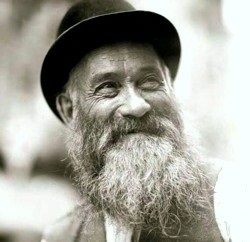Motke Chabad and His Best Joke* (Jewish humor)
by Pinchos Fridberg,
[an old Jew who was born and raised in Vilnius]
<Rebe>, will there ever come a time when the words <Vilne un Yidish> [Vilne and Yiddish] will be inseparable again?”
“<Saydn nor mit Meshiekh’n in eynem> [Not unless it comes with the Messiah].”
§§§
Would you like to know what an old Jew does after a delicious and satisfying lunch?
I’ll tell you: he lies <af a sofke> [<a sofke> – diminutive of sofa] <un khapt a dreml> [and grabs a nap].
And then what?
And then he dreams that …
A few days ago I received an e-mail from motke.chabad@xxxxx.com containing an incredible proposal: the author asked me to prove to him that I really am an old Vilna Jew <an alter vilner Yid>. I wouldn’t tell you these <bobe-maise> [old wives’ tales] if not for the way he suggested proving this.
It was clear from the first three words that the author’s native tongue was Yiddish.
<Main tayerer reb> [my dear mister] Pinchos!
<Mir iz kemat 80> [I am almost 80]. I <abisale> [a little bit] speak and write Lithuanian. My last name is Chabad and my name is Motke. I received this name in honor of my famous grandfather, according to Jewish tradition.
<Zaine vizn> [his jokes] spread <gikher vi di hits in parovoz> [faster than heat in a steam-engine locomotive]. If you can tell me some of the best known of these jokes, <ikh vel gleybn, az ir zayt an emeser> [I will believe that you are a real] <vilner id>.
As you can understand, Motke hit me in my most vulnerable spot, and I was unable not to reply to him. So this is what I wrote him:
Dear <reb Motke>!
“I read your letter, I laughed, and tears flooded my eyes. <Tsum groysn badoyern>
[to our great regret], old Vilnius Jews who speak the <mame-loshn> [Yiddish], <kemat nit geblibn> [are almost all gone]. <Alte yidishe Vilne> [Old Jewish Vilnius] has entered non-existence and will never return. <Saydn nor mit Meshiekh’n in eynem> [Unless it returns with the Messiah].
I hope my making your letter public doesn’t embarrass you.
My mother, may her memory be blessed, who was born <in Vilne> back before World War I considered your grandfather’s best jokes these ones:
<Motke, zog nit trakhtndik a lign, gib ikh a rubl>
<Chost gezogt, a du vest gebn zvei>
[Motke, without thinking tell a lie, and I’ll give you a ruble.]
[But you said you’d give me two.]
Now, Motke, do you believe that I am <an emeser> [a real] <vilner id>?
P.S. Motke, I suggest we remember and revise your grandfather’s jokes together. So the Jews who have survived could have a laugh. After all, not all of them will live to see the coming of the Messiah.
*Note:
Just one!!!
But a big one at that:
a) Ruta Bloshtein and the author managed to “convert” a “Russian-Yiddish mix” into a “Lithuanian-Yiddish” one. Ruta’s native language is Lithuanian and the author’s is Yiddish.
b) Motke Chabad (his real name is Mordechai Broinshveig; he died in 1900) is well known in the Jewish world, lived in Vilnius, and was a maker of jokes with a sharp tongue. Shloyme Bastomski (born in Vilna, 1891, died at Paneriai, 1941) collected and published his jokes (<Maiselakh vegn Motke Chabad> [Stories about Motke Chabad] Vilnius, 1940).
с) We present English transcriptions of Yiddish expressions within greater-than and less-than symbols, < and >, and English translations in square brackets, [ and ].
d) Translation from Yiddish of several words and expressions:
<rebe> – rabbi, used when addressing a rabbi;
<reb> – honorific, equivalent to “mister;”
<Vilne> – Vilnius;
<a yid> – a Jew;
<a vilner id> – A Jew born and raised in Vilnius; until the war this was the “top brand” in the Jewish world.
—
Translated from the Lithuanian by Geoff Vasil.


